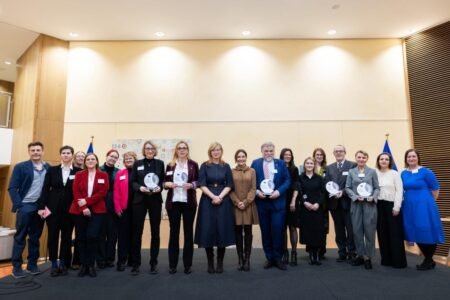(BRUSSELS) – European foreign ministers reiterated Monday their ‘united and clear messages’ on the importance of preserving a two-state solution for and the status of Jerusalem as the future capital of two states.
Europe’s foreign policy chief Federica Mogherini reiterated the EU’s commitment to a two-state solution for Israel and Palestine at an informal lunch of EU foreign ministers with Palestinian President Mahmoud Abbas in the margins of the Foreign Affairs Council.
The EU also declared its opposition to the settlement activity which it considers illegal under international law.
“To achieve this goal we need to speak and act wisely and consistently with a sense of responsibility,” said Ms Mogherini: “This is not the time to disengage; on the contrary. We believe Palestinians and Israelis need to show, more than ever before, their engagement with the international community, with key actors in this process, so that we can together work towards a negotiated outcome.”
Ahead of the informal lunch, the Council held discussions on the latest developments in the Middle East Peace Process. Ministers looked at how the EU can help ensure engagement by all relevant players in order to advance the peace process.
At the meeting, the foreign ministers also held a debate on Libya. The UN Secretary General’s Special Representative Ghassam Salamé gave an overview of the state of play of the political process, including progress towards the adoption of a new Constitution and the forthcoming elections. Ministers gave them their full support for efforts to bring about unity and reconciliation in the country.
They also discussed the importance of EU engagement in Libya as a way of supporting the UN in its efforts to bring about political stability, as well as those UN agencies working to address the situation of migrants in Libya. Ministers also highlighted the importance of continuing to work with countries of origin, in particular in the Sahel region.
On future relations with African, Caribbean and Pacific states, the ministers had an initial exchange on the Commission’s recommendations for a future agreement between the EU and the ACP countries, with the current agreement framing the partnership, the Cotonou agreement, is due to expire on 29 February 2020.
The ministers expressed broad support for the Commission’s approach to move towards an umbrella agreement at ACP level combined with three regional tailored partnerships for Africa, the Caribbean and the Pacific. They underlined the importance of building on the experience gained through cooperation under the existing Cotonou agreement, in particular on political dialogue and on migration.
Discussions on the negotiating mandate are due to continue within relevant Council preparatory bodies, with a view to adopting a decision authorising the opening of negotiations and the negotiating directives within the first semester of 2018.








